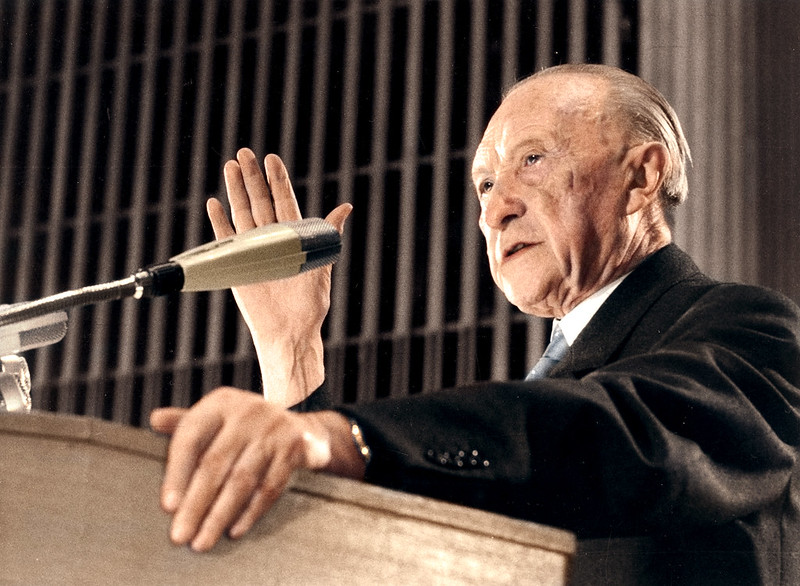This page contains automatically translated content.
This is how much NSDAP past the Bonn elite had during the Adenauer era
 Image: Peter Schubart.
Image: Peter Schubart. Image: Jared Enos/CC BY-NC-ND 2.0
Image: Jared Enos/CC BY-NC-ND 2.0Prof. Dr. Sylvia Veit, head of the project, explains that one can only speak of an unencumbered West German elite after the war to a very limited extent. A considerable proportion of the political and administrative staff between 1949 and 1963 had previously been members of the NSDAP: Of 283 top officials in the federal ministries in Bonn and in the chancellor's office, 105 were (this is not known for another 99 people, but cannot be ruled out either). Also, of 51 ministers in the same period, 13 are known to have been members of Hitler's party (once unclear).
In contrast, only 15 persons (out of a total of 334 top officials and government politicians) were members of a central office of the NSDAP; this refers, for example, to the Main Office for Public Health or the Main Office for Local Politics. National Socialist statements are documented from 46 persons; from seven persons even acts of violence for National Socialism, for example participation in a pogrom or approval of deportations to concentration camps. Eleven men were officers in the SS, SA or SD.
On the other hand, very few of the top officials and politicians came from opposition to the Third Reich: 21 of the 334 people were imprisoned, and 60 suffered material damage, for example because they were deprived of property. 17 people are known to have been former members of a resistance organization.
"Our findings confirm that the young Federal Republic relied to a considerable extent on top political and administrative personnel who had previously come to terms with the Third Reich," commented Prof. Dr. Sylvia Veit, who heads the Department of Public Management at the University of Kassel. "Neither was it the case that unbrokenly convinced National Socialists continued to work in democratic institutions; but neither can it be said that a new start was undertaken with personnel who came from the resistance to fascism. For the first time, we provide evidence of this with a comprehensive record of all career paths of top personnel."
Male, PhD, lawyer
However, the Kassel researchers not only examined party affiliations, but also collected data on social structure. The fact that virtually all politicians and top officials in the Adenauer era were male comes as little surprise. The fact that almost half of all politicians came from Bavaria (23.5 %) or North Rhine-Westphalia (21.6 %) can also be explained by the size of the states. What is striking, however, is that about one in two civil servants had studied law; and nearly two-thirds of all civil servants between 1949 and 1963 (and even about 70 percent during Adenauer's first term in office) had earned a doctorate or even a habilitation in this or another subject - a figure that has since fallen to below 40 percent.
The study on the Adenauer period is part of a larger research project and has now been published as a working paper at https://kobra.uni-kassel.de/handle/123456789/12535. The overall research project "New Elites - Established Personnel? (Dis-)Continuities of German Ministries in System Transformations" is funded from 2017 to 2021 by the Federal Commissioner for Culture and the Media as part of the research program on coming to terms with the Nazi past of central German authorities and is being conducted at the Department of Public Management at the University of Kassel under the direction of Prof. Dr. Sylvia Veit. The biographies of all persons who were members of the government or head of state of the German Reich, the Federal Republic or the GDR in 1913, 1920, 1927, 1934, 1939 or 1944 as well as since 1949 (politicians) or who held a leading position in a ministry at the highest state level (political officials) were evaluated.
More than 3,500 biographies were evaluated. Sources included personnel and cadre files in the Federal Archives as well as files of the NSDAP, the SED and their respective affiliated associations, publicly available curricula vitae, newspaper archives as well as the handbooks of the Federal Government, the handbooks for the German Reich and the Directories of East German Officials published by the CIA. The partial study of the reign of Chancellor Konrad Adenauer discussed here was based on 334 biographies (51 politicians, 283 officials).
DOI: doi:10.17170/kobra-202102183292
Link to study results: https://kobra.uni-kassel.de/handle/123456789/12535
Link to further results of the research project: https://kobra.uni-kassel.de/handle/123456789/11789
For more results of the study, a podcast will be available at www.uni-kassel.de/go/podcasts beginning in early May.
Contact:
Prof. Dr. Sylvia Veit
University of Kassel
Department of Public Management
E-mail: sveit[at]uni-kassel[dot]de
Press contact:
Sebastian Mense
University of Kassel
Communication, Press and Public Relations
Tel.: +49 561 804-1961
E-mail: presse[at]uni-kassel[dot]de
www.uni-kassel.de